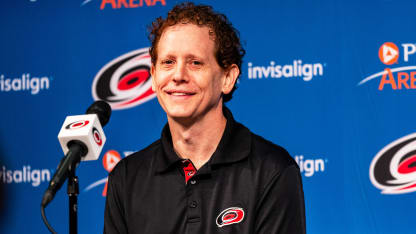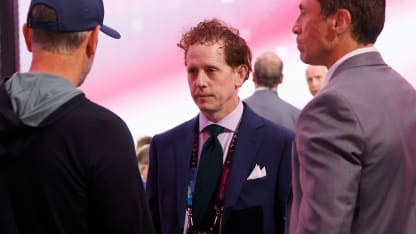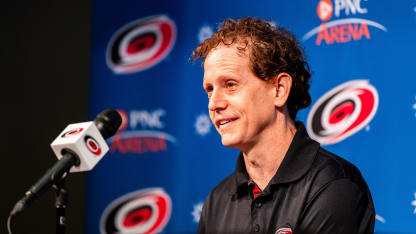It feels like a long time ago, both in Tulsky’s life and in the way that data has changed in hockey and the way that hockey has changed because of data.
“I think over those 10 years,” Tulsky said, “the kinds of questions that data can answer have evolved and our ability to provide useful answers in more areas and more complete answers in some areas has really taken steps forward.”
The acceptance, too.
“I was in Atlanta for 12 years and it wasn’t even talked about from ’99 to 2011,” Waddell said. “You look at where our game’s come from, now most [teams] have four or five people in the analytics department where you never even thought about having an analytics department.
“I think there’s lots of space to continue to grow because some of the tools that are coming into play through the NHL, with puck tracking and all the things the NHL is doing and things that individual teams are doing, it’s only going continue to grow.
“Analytics can’t drive your decisions, but they can certainly support what you’re seeing and what you’re thinking and certainly be a part of that decision making.”
There is more understanding around the NHL about what data can provide, about how to incorporate it, about its benefits and limitations.
It has become, simply, part of how business is done.
“In every single industry, the initial reaction from people who have been doing it their whole lives without data is to say, ‘I’ve been doing it my whole life without data and I’ve done just fine,’” Tulsky said. “This is a very, very natural reaction and it’s universal.”
But through his 10 years with the Hurricanes, through the NHL’s evolution, Tulsky has seen attitudes change, acceptance grow. He has seen appreciation for the way he solves the puzzles and problems that hockey puts in his way.
The Hurricanes have always been a collaborative organization, making sure everyone’s voices have a place, that ideas are shared and valued. Waddell ensured that, while Tulsky was with the Hurricanes, that he mentored him and tried to help him grow in his thinking, how to deal with issues and, more crucially, how to some up with solutions.
He saw that Tulsky had what it took. He saw how he managed people, how those under him liked and respected him and his work, the ethic that he brought to his job.
“What happens in our business, you’re faced with all kinds of adversity and different problems,” Waddell said. “Some people can handle it and some people can’t handle it maybe all the time. And Eric’s one of those people that you throw something at him, he’s going to figure out what the answer is.
“I think one of the things that rose him to this position was that being a GM, as much it’s got its very highs and peaks, it’s tough sometimes because you’ve got to make tough decisions and sometimes those decisions, I always say, they’re not what the fans want to hear, not what somebody else wants to hear. But you make decisions based on what’s the best for your hockey club and I think Eric’s capable of that.”
And then there was the sheer intelligence.
Waddell called Tulsky “probably the smartest person I’ve ever dealt with. I used to always tell him, ‘You told me once, now tell me in plain English what you just told me.’”
As Hurricanes defenseman Jaccob Slavin said, “He’s just outthinking everybody in the room. He walks in and I think he knows he’s the smartest person in the room, but he doesn’t carry himself that way.”
It’s enough that he -- not a former player or a former agent -- is now in charge in Carolina.
“I just remember that there was a stereotype when I used to follow baseball more closely of sort of this calculator-carrying -- this machine who had no understanding of people -- but I think Eric’s maybe best trait is that he is really high-empathy and he understands that it’s not just numbers, these are people,” Yang said.
That was why, when Waddell left the Hurricanes on May 24, hired as the Columbus Blue Jackets GM four days later, Tulsky was elevated to interim GM before getting the full-time position in June.
“I’m 100 percent ready,” Tulsky said. “I am fortunate to have an incredible head coach (Rod Brind’Amour) and an incredible management staff, and so there are a lot of people there to make my job easier. There are a lot of ways in which I don’t need to dramatically change anything. I just need to keep things running the way they have been.
“So, that helps a lot for a first-timer. I am not walking into a place that is broken and needs a huge overhaul. I’m walking into a place that is really running smoothly and just needs a new person helping keep it on the rails.”
Still, when Tulsky got the job this offseason, he was not only faced with multiple player contracts that needed to get done -- including those of forwards Martin Necas and Seth Jarvis, with the latter ending up with a unique deferred-payment structure that lowered his average annual value from $7.9 million to $7.5 million on an eight-year deal -- but about 80 percent of the Hurricanes’ staff contracts were up.
There was not much downtime.
There was also an assistant general manager spot to fill.
And there, he dipped back into his old well, the group that had found each other on Twitter in those early days, one of the first of the crop of analytics hires back in 2014 and 2015. In addition to elevating Yorke from assistant GM to associate GM, Tulsky hired Dellow, who was the New Jersey Devils senior vice president of hockey strategy and analytics, as the Hurricanes’ new assistant GM.
It just made sense.
“He’s a numbers guy first and foremost and he’s making all of us look good,” Orach said of Tulsky. “He’s very thoughtful, he’s very hardworking, he’s such a nice guy that you’re just happy for him, just thrilled that he did take that risk, that he did take that gamble and, certainly, that the Hurricanes took that gamble on him and it just worked out, it seems like.
“He’s very, very clever. And I wish he was in charge of my favorite NHL team.”




















